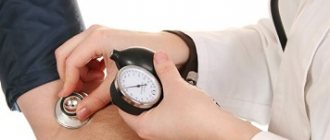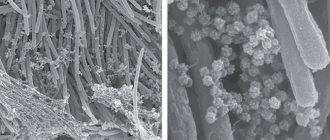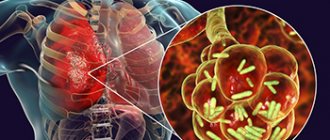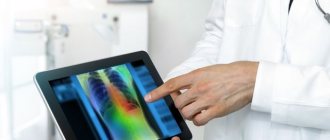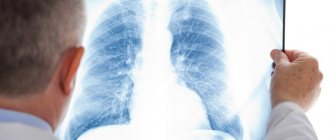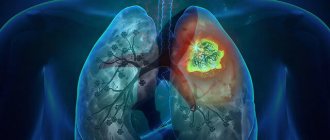Pneumonia is an infectious disease that develops under the influence of various microorganisms. Cough with pneumonia in children and adults is one of the main signs of the disease. At the Yusupov Hospital, pulmonologists provide comprehensive treatment for pneumonia, including both drugs that destroy infectious agents and drugs that help reduce cough.
The therapy clinic employs professors and doctors of the highest category, who are leading experts in the treatment of respiratory diseases. They take an individual approach to the treatment of each patient, use antitussive and mucolytic drugs depending on the characteristics of the cough, physiotherapeutic procedures, and massage. Cough due to pneumonia in children is treated in partner clinics.
Types of cough
Does cough occur with pneumonia? In the initial stage of pneumonia, patients are bothered by a dry cough. As the amount of bronchial secretion increases, it becomes moist and produces sputum. A barking cough is very rare with pneumonia. It occurs when there are complications from the respiratory system.
Spasmodic cough, associated with spasms and whistling sounds, occurs when bronchial obstruction and bronchospasm occur in patients suffering from pneumonia. It can occur at any time of the day or night, but more often bronchospasm occurs while awake. A dry, hacking cough is called staccato.
What is the cough associated with pneumonia in children? Pertussis-like cough occurs in attacks that follow each other, perhaps in both children and adults. Coughing attacks bring the body to extreme exhaustion. When foreign objects enter the respiratory tract, a bitonal cough occurs - a low tone alternates with a high one. A hoarse cough is evidence of the lack of correct restoration of respiratory function.
A dry cough with pneumonia develops due to bacterial or viral damage to the lung tissue. It is caused by local irritation of the bronchi. In this case, sputum is not produced. With viral pneumonia, a dry cough may produce a small amount of sputum streaked with blood.
A forced, wet cough is typical of pneumonia. It is explained by the presence of mucus in the respiratory tract, which the body tries to remove by coughing. Sputum can be serous, purulent, mixed. With lobar pneumonia, “rusty” sputum is released during coughing. The presence of blood in sputum may be evidence of a malignant neoplasm or tuberculosis.
With viral pneumonia, a barking cough has the following features:
- urge to cough, not accompanied by sputum production;
- at the end of any coughing attack, irritation of the mucous membrane of the pharynx occurs, which is accompanied by the release of a small amount of viscous sputum;
- attacks are characterized by cyclicity.
Cough can occur for several reasons:
- direct irritation of respiratory tract receptors under the influence of pneumonia pathogens;
- allergic reactions;
- intoxication;
- entry of foreign bodies into the respiratory tract;
- vasomotor disorders;
- external pressure on the vagus nerve;
- primary central nervous system;
- reflex irritation.
How to recognize coronavirus pneumonia in time
The asymptomatic manifestation of coronavirus pneumonia was described at the very beginning of the pandemic, when a focus of viral infection was discovered on the cruise ship DiamondPrincess. Half of all patients had no symptoms, the diagnosis was made after examination and computed tomography. At the initial appointment, neither a cough with shortness of breath nor an increase in temperature were detected. Pneumonitis did not change the general condition of people.
The disease makes itself felt when it develops into a severe form, when the symptoms are pronounced and diagnosis is not particularly difficult. Therefore, when treating at home, it is necessary to urgently call a doctor if a sudden change in temperature occurs that lasts more than 5 days. This can be either a fever (38°C or higher) or a decrease in readings to 36°C or less (it is accompanied by a sharp loss of strength and general weakness). If the temperature is very low, a person should be immediately hospitalized, since, according to the latest statistics, such patients have a higher mortality rate than those with fever.
Other signs of coronavirus pneumonia:
- The patient begins to choke, he does not have enough air even at rest.
- He suffers from painful attacks of dry cough that does not bring relief.
- A person experiences a stabbing pain in the chest and a severe headache begins.
On the part of the cardiovascular system, arrhythmia is observed: the heart is either rapid or beating slowly. This is accompanied by sudden changes in blood pressure (dystonia).
Antibacterial therapy for pneumonia
The cause of cough during pneumonia is an inflammatory process caused by a variety of microorganisms. The cough goes away only after the inflammatory process is eliminated. Pulmonologists at the Yusupov Hospital begin initial antibacterial therapy immediately after the patient’s admission to the therapy clinic.
Since it takes some time to isolate the causative agent of pneumonia and determine its sensitivity to antibiotics, at the initial stages the antibiotic is chosen empirically, based on the clinical picture of the disease and X-ray data. After identification of microorganisms, selective drugs are used to minimize the impact on the patient's saprophytic flora, reduce the risk of superinfection and avoid immunosuppression.
Therapists at the Yusupov Hospital use antibacterial drugs that are highly effective in treating pneumonia of various origins. The choice of antibiotic is influenced by the following characteristics of the body: age, history of allergies, kidney and liver function, pregnancy, severity of the disease.
When prescribing antibacterial therapy, doctors at the Yusupov Hospital take into account the possible side effects of antibiotics and avoid prescribing medications that can cause them. When choosing an antibacterial drug in patients with pneumonia against the background of chronic renal failure, reduce the dose of the drug secreted by the kidneys or prescribe an antibacterial drug that is metabolized in the liver. For patients with signs of functional liver failure, the doses of drugs that are metabolized in this organ are reduced or antibiotics excreted from the body by the kidneys are prescribed.
If a patient has heart failure and obesity, the concentration of antibiotics in the blood increases, which is associated with the risk of side effects. In this case, long-acting antibiotics (cefoperazone, roxithromycin, ceftazidime, clarithromycin) are not used. Elderly and senile people are prescribed drugs that are most effective with minimal side effects.
Pulmonologists give preference to drugs that create high and stable concentrations in sputum, which allows the patient to quickly get rid of cough. Amoxicillin meets these requirements. When treating severe pneumonia, broad-spectrum antibiotics are prescribed that are active against betalactamase-producing staphylococci and streptococci, as well as gram-negative microorganisms (Escherichia coli, Enterobacteriaceae, Haemophilus influenzae, Klebsiella). “Protected” aminopenicillins (ampicillin sulbactam, amoxicillin clavulanate) or second generation celafosporins (cefuroximaxetine) are used.
For severe pneumonia in patients requiring intensive care, the drugs of choice are third-generation cephalosporins (cefotaxime or ceftriaxone), which are used in maximum doses in combination with macrolides for parenteral administration (spiramycin, erythromycin). After the elimination of the inflammatory process in the lungs, patients' cough decreases.
Symptoms of the inflammatory process
All these conditions are accompanied by a prolonged increase in temperature, weakness, and general malaise. After pneumonia, the patient is susceptible to infection with various infections, which can manifest themselves as symptoms of the inflammatory process:
- chills, weakness;
- cough;
- malaise, lethargy;
- decreased or lack of appetite;
- respiratory dysfunction;
- headache;
- aches in bones, joints;
- pain in the ears, trachea;
- runny nose;
- enlarged lymph nodes.
Treatment of cough with pneumonia
Pulmonologists at the Yusupov Hospital prescribe the following drugs to reduce cough:
- mucoactive agents that change the properties of sputum;
- expectorants that affect the physical and chemical properties of sputum and facilitate its separation;
- combination drugs;
- mucoregulating drugs.
Acetylcysteine, bromhexine and ambroxol are highly effective. Among drugs with mucoregulatory action, the most widely known are drugs based on carbocisteine. Preparations of reflex action have an expectorant effect: ipecac root, licorice, marshmallow, thermopsis herb, thyme, plantain leaves, eucalyptus, anise fruits. Resorptive drugs (ammonium chloride, sodium and potassium iodide, terpene hydrate) after ingestion and enter the systemic circulation, are secreted by the bronchial mucosa, stimulate bronchial secretion and partially dilute sputum. For a dry cough, pulmonologists prescribe plenty of fluids, codeine, Tusuprex, Stoptussin. After the appearance of sputum, they are canceled.
Patients at the Yusupov Hospital are given ultrasonic inhalations with cough-reducing medications and alkaline solutions. Chest massage and physical therapy promote the removal of sputum. Thermal procedures are effective.
If you are worried about a cough, call the Yusupov Hospital, where pulmonologists will determine its cause and prescribe effective treatment. Physiotherapy treatments are available at the rehabilitation clinic. An integrated approach promotes a speedy recovery.
Playing blind
Most outpatient doctors immediately prescribe medications without properly examining the patient. The worst thing is that the doctor, in the absence of information, cannot adequately formulate his own indications for hospitalization.
“It often happens that people come to the hospital, literally breaking all the laws, doing tests on their own in a commercial laboratory, deceiving their doctor, deceiving the laboratory, saying that he is not sick with Covid, and self-propelled - on foot, in personal transport, in a taxi - arrives to the hospital in serious or moderate condition.”
Time for antibiotics: when needed
In the early stages - up to the 8th-9th day - there can be no talk of antibiotics at all. During this period, coronavirus pneumonia develops, which cannot be stopped by prescribing antibiotics.
Some may develop secondary bacterial pneumonia. This occurs more often in people with an initially suppressed immune status. For example, with decompensated diabetes mellitus.
“When there is a lot of glucose in the blood, bacterial microflora has a greater chance of superimposing viral pneumonia and stimulating the proliferation of bacteria in the lungs. It has certain laboratory signs. We cannot prescribe antibiotics for diabetes and Covid for prevention. Because it won’t work for prevention, antibiotics don’t prevent secondary bacterial pneumonia, they only treat it.”
To prevent the development of bacterial pneumonia, it is necessary to reduce glucose levels with the help of glucose-lowering drugs or insulin under the supervision of a doctor.
Photo: Vladimir Gerdo/TASS
Coronavirus therapy now [RECOMMENDATIONS] First aid kit for Covid
These recommendations from our expert should only be used after consultation with your doctor.
- If possible, buy a pulse oximeter and monitor your saturation readings.
- Of the medications, first of all, it is necessary to have any antipyretics. The WHO warning that some antipyretics worsen the course of the new coronavirus infection has now been completely debunked. This warning was withdrawn back in March.
- You can also use any usual painkillers (in the absence of individual contraindications).
- For those taking birth control pills or who have a tendency to clot, it is necessary to have anticoagulants. These are drugs that thin the blood and prevent the formation of blood clots.
- When taking anticoagulants and antipyretics, you need to remember to protect the stomach (omeprazole, famotidine, etc.) to avoid gastrointestinal bleeding.
- If you have a new coronavirus infection, you should drink more fluids to prevent dehydration and kidney problems.
Do not forget that the doctor must explain to the patient what he is prescribing and why.
*Based on materials from Oksana Stanevich’s broadcast for the “Not in vain” foundation and personal consultation for the “SP” publication.
The deficit we create ourselves
Since spring, people in panic began to buy everything they thought they needed. At first it was buckwheat and toilet paper, then lemons, garlic and ginger, then medical masks, and gradually the turn came to basic mercury thermometers and medicines.
Those who have encountered coronavirus infection more closely may know about the drug dexamethasone, its analogue is prednisolone. Now it is almost impossible to find dexamethasone in pharmacies. There have been rumors that it can supposedly cure cytokine storm, is effective in preventing coronavirus, or can stop the more complex, fatal course of covid.
In the photo: oxygen concentrator (Photo: Sergey Malgavko/TASS)
“Back in the summer, a study was conducted in the UK, which showed that the administration of dexamethasone actually improved the outcome of the disease and made it possible not to develop more severe respiratory failure. However, there was one “but”, which for some reason is again not taken into account anywhere. The benefit of dexamethasone has been shown only in combination with oxygen support (prescribed when saturation decreases below 95%). In the absence of oxygen support, outcomes did not improve and there was even a trend towards worse outcomes.”
In outpatient treatment, dexamethasone cannot help. And if you decide to buy it “just in case,” then do not forget to buy an oxygen concentrator, the cost of which varies around 60-70 thousand rubles.
Spectacular side effect
The regimen of hydroxychloroquine and azithromycin that was initially recommended has significant side effects. Hydroxychloroquine damages the heart tissue, which can lead to heart rhythm disturbances, including paroxysmal atrial fibrillation. A rhythm disturbance can cause cardiac arrest or provoke the formation of blood clots.
The fact that hydroxychloroquine not only does not work, but is also harmful, became clear back in the summer. However, outpatient and sometimes inpatient doctors continue to prescribe it.
Moreover, it is included in clinical recommendations and, for example, in St. Petersburg is given free of charge to people who are being treated for Covid at home.
The azithromycin and levofloxacin regimen is also toxic to the heart and also disrupts the heart rhythm.
***
When taking antibiotics as an outpatient, antibiotic-associated diarrhea often occurs. This may hide a more serious complication - pseudomembranous colitis. Simply put, it is an inflammation of the large intestine where plaque-like, membrane-like formations appear on its walls. This manifests itself as an increase in bowel movements up to 5-10 times a day, but can reach up to 20 times.
When bacteria multiply, many toxins are released into the blood, which can lead to fever, intoxication, dehydration and septic condition. In extreme cases of dehydration, the kidneys, heart and brain begin to suffer.
The intestines may not work until intestinal paresis occurs. This condition can only be treated with surgery and is potentially life-threatening.
“We have had several cases where we have proven the occurrence of colitis due to pre-hospital antibiotic use. There is an analysis that allows us to determine that this is pseudomembranous colitis. This is a stool test for toxins A and B. Even if one toxin is detected, it is already colitis.”
Unfortunately, coronavirus infection simply does not have an application point for the use of antibiotics. It is impossible to cure Covid with antibiotics.
“A fatal complication of coronavirus infection—acute respiratory distress syndrome, when suddenly all the lungs shut down, the affected area expands, respiratory failure develops, and the person dies—antibiotics do not help.”
Useless antibiotics
One of the common mistakes is prescribing antibiotics. But antibiotics have no effect on the coronavirus itself.
Back in the spring, research was carried out “in a hurry” and a regimen was developed - a combination of azithromycin and hydroxychloroquine. In laboratory conditions, hydroxychloroquine showed a positive effect, and the antibiotic azithromycin was used as a “courier” of hydroxychloroquine inside the cell.
In practice, this combination did not work. It did not improve the outcome of the disease, and people died just as often as those who did not receive these drugs. Moreover, this combination does not shorten the length of hospitalization and does not shorten the stay of the virus in the body.
